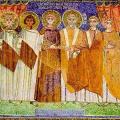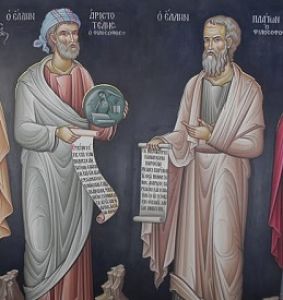309. Hooked on Classics: Italos and the Debate over Pagan Learning
The trial of John Italos and other signs of Byzantine disquiet with the pagan philosophical tradition.
Themes:
• P.A. Agapitos, “Teachers, Pupils and Imperial Power in Eleventh-Century Byzantium,” in Y.L. Too and N. Livingstone (eds), Pedagogy and Power: Rhetorics of Classical Learning (Cambridge: 1998), 170-91.
• R. Browning “Enlightenment and Repression in Byzantium in the Eleventh and Twelfth Centuries,” Past and Present 69 (1975), 3-23.
• B. Bydén, “‘No Prince of Perfection’: Byzantine Anti-Aristotelianism from the Patristic Period to Plethon,” in D. Angelov and M. Saxby (eds.), Power and Subversion in Byzantium (Farnham: 2013), 147-76.
• L. Clucas, The Trial of John Italos and the Crisis of Intellectual Values in Byzantium in the Eleventh Century (Munich: 1981).
• K. Ierodiakonou, “John Italos on Universals,” Documenti e Studi Sulla Tradizione Filosofica Medievale 18 (2007), 231-47.
• P. Joannou, Die Illuminationslehre des Michael Psellos und Joannes Italos (Freising: 1956).
• F. Lauritzen, “The Debate on Faith and Reason,” Jahrbuch der österreichischen Byzantinistik 57 (2007), 75-82.
• A. Kaldellis, Hellenism in Byzantium: the Transformations of Greek Identity and the Reception of the Classical Tradition (Cambridge: 2007).







Comments
I think the "case" against
I think the "case" against Italos' theological orthodoxy is a little stronger than this episode suggests. Recent articles by Dirk Krausmuller and Timur Schukin suggest that Italos's Platonic commitments led him to take positions on the human soul and icons that were at odds with orthodoxy. Krausmuller looks at Italos' Opusculum 37 and 50, which assert that the soul is immortal in terms of its substance, but mortal in terms of its activity, and argues that Italos is drawing on a notion of the soul's faculties that suggest it is capable of a sort of pure intellection while disembodied, but nothing else (and most specifically, not capable of utilizing any of the functions of discursive rationality, including memory). This leads him into conflict with orthodox views on the current ability of the saints to hear and respond to prayers.
Schukin looks at the text of Italos' trial, and argues that the accusation against him in the text is both credible in itself (in terms of the view it imputes to Italos) and correct in arguing that Italos' view manages (paradoxically) to simultaneously be both iconoclastic and to authorize an improper "worship" (latreia) of images. In the text of the trial, it is asserted that Italos stated that he "served the icon of the incarnated Son of God not remaining among the shadows but rendering honour to the prototype." As Schukin notes, Italos' use of the word "shadows" here reflects usage in Plato's Republic, where the "shadows" are, in themselves, nothing at all, being only a sort of image of real being. Schukin also notes that Proclus' commentary on the Republic explicitly makes the connection between the contemplation of material reality as an image of real being and making "images" (ie. actual artifacts) that make that connection more obvious and explicit. On this view, idolatry is avoided not by distinguishing the sort of reverence that is due to them, but by recognizing that these "shadows" are actually nothing at all, so that the worship of an image just is the worship of God, because God is the only reality in the image. This is fundamentally different from eg. John of Damascus's view that matter is a good creation of God, but not to be confused with God in worship. The difference between these two approaches can help to show how the first view could be both iconoclastic (in terms of denigrating the matter of which icons are composed) and iconolatrous (in terms of not distinguishing properly between Creator and creature) from the point of view of the second.
My own view on Italos is that he didn't intend to follow pagan philosophy instead of Christian religion, but rather was eager to harmonize the two, sometimes to the point of glossing over genuine differences. Of course, this doesn't mean that every accusation against Italos was true (needless to say, I think it's safe to reject the cliff-jumping anecdote), but it does mean that Italos may not have been the most careful scholar in terms of comparing the Platonic and Christian traditions. For that reason, I think the Italos condemnation may have played a constructive role somewhat similar to the Paris condemnation under Tempier, in terms of forcing intellectuals to more carefully consider the ways theology and philosophy could relate to each other, and to really integrate their philosophical and religious commitments rather than just making an inconsistent mash of the two.
In reply to I think the "case" against by Ryan W
Italos' orthodoxy
Thanks, that's really interesting - I will have to track down these two articles and use them in revising for the book version. From your summary it sounds to me like the most one could say is that Italos had said some incredibly subtle things that were then heinously distorted in the accusations to make him sound like both an outright iconoclast and a hyper-iconophile, which of course is absurd. Whatever basis we might detect for the accusations, the fact that he was accused of obviously and wildly inconsistent views is a bad sign for the seriousness of the accusers. So it seems to me that we inevitably are going to understand this event better in terms of the political situation, and why they were searching around for a scapegoat, than by looking at anything Italos had said or thought. Still it is worth figuring out which straws they were grasping at.
I'm slightly puzzled by your closing remark about the Paris condemnation; usually when people present that as having had a positive outcome, it is in terms of unintended consequences e.g. making space for development towards modern science by eliminating certain Aristotelian restrictions. The idea that scholastics had been running around embracing inconsistencies until Tempier made them more careful seems to me, to put it mildly, questionable:. In fact, as I pointed out in the relevant episode the condemnation text is itself internally inconsistent.
So I think in both cases it is the accusers who come out of it looking like intellectual lightweights who had ulterior motives for their really pretty crass and careless interventions (and indeed who had political motives for not wanting to be more careful).
In reply to Italos' orthodoxy by Peter Adamson
Italos' orthodoxy
I would be inclined to make a strong distinction between Italos' original accusers, who seemed to throw pretty much anything they could at him to see if it would stick, and the officials who actually adjudicated the case. The judges presumably felt pressure to arrive at the "right" conclusions and condemn Italos, but don't seem to have been sloppy or careless in the way they did it. Italos was allowed to make submissions to the court, and the final judgment was made on the content of the submissions rather than on the basis of words imputed to Italos' by others. Looking at the issue of icons specifically, the court in the end only accused Italos of iconolatry, given that that was what it found in Italos' own statement. In any case, I think there is a real substantive difference between what Italos said about icons and what the "heroes" of the iconoclastic controversy, John of Damascus and Theodore the Studite, said. Italos' view, where the material world is a "shadow" of God, to such an extent that the physical things like icons can be treated as if they are nothing other than God, and John and Theodore's view, where the material world is a manifestation of God's goodness that "declares" God, but should never be confused with him, seem to me to be genuinely and importantly different. Furthermore, since Italos' view on this issue seems to be more or less identical to Proclus' view in his Republic commentary, it seems like Italos has (at least in this case) done precisely what he was accused of doing, following the "outside philosophers" rather than the "Fathers" of the iconoclastic controversy. Of course, from the point of view of the history of philosophy, this isn't a fault on Italos' part; it's just a case of him adopting a view different from that of some other Byzantine figures. But it might affect our view of the history of his condemnation somewhat. It might have been a case where Italos' political foes set out to "frame" him, but eventually realized they didn't have to, like someone who breaks into an enemy's house to plant evidence, then just happens to find that the house is being used as a meth lab.
In regard to the Paris condemnation, what I was getting at was the idea that the condemnation didn't just motivate people to find alternatives to certain Aristotelian ideas; it also more generally struck at Aristotle's philosophical authority. In my opinion, from a purely philosophical point of view, the main failing of the Averroists (both Averroes himself and the Latin Averroists) is that they never really challenged Aristotle. It seems like, for them, the work of philosophy was more or less just to figure out what Aristotle said, then to affirm it (either as being true simpliciter, or at least as being the best that human reason can achieve). I think most people would agree that Henry of Ghent and Duns Scotus, for example, are more interesting and insightful thinkers than Siger of Brabant and Boethius of Dacia, and I think the reason is that they really argue with Aristotle. Even if the condemnation itself was poorly-thought out and inconsistent, it seems to me to have had a positive effect, not only by encouraging people to reject this or that specific idea of Aristotle, but by pushing people to take a more critical and selective approach to Aristotelian philosophy in general than the Latin Averroists did. I agree that Tempier ended up with egg on his face, but it still seems to me that his clumsy intervention ended up being mostly positive in its effects.
In reply to Italos' orthodoxy by Ryan W
Orthodoxy
Ok thanks for those clarifications. I like the distinction you make concerning Italos and I think I pretty much agree with what you say about the Paris condemnations, as well. Maybe the question there, historically at least, is to what extent the condemnations were really important in weakening Aristotle's grip on the scholastic mind. That sounds plausible but people usually think of Aquinas as working creatively within an Aristotelian framework, like Henry and Scotus, but he was of course a target of the condemnation and not what you are thinking of as a "beneficiary." I think also that the so-called Averroists are more interesting than that, though admittedly more as creative interpreters of Aristotle than challengers to him; to say nothing of Averroes himself who was a very creative thinker, both when he was commenting on Aristotle and when he wasn't. In general I am pretty suspicious of the idea that the interesting or innovative medieval thinkers are the ones who are less devoted to Aristotle's authority. But more importantly, maybe, I am not sure I really buy that the condemnations made the kind of difference you are suggesting: because if we look at the 14th c they are basically doing everything within an Aristotelian framework still, just like Aquinas and the Averroists did - which, again, doesn't rule out creativity. The real break comes with humanism and that had nothing to do with Tempier or other censors.
Add new comment